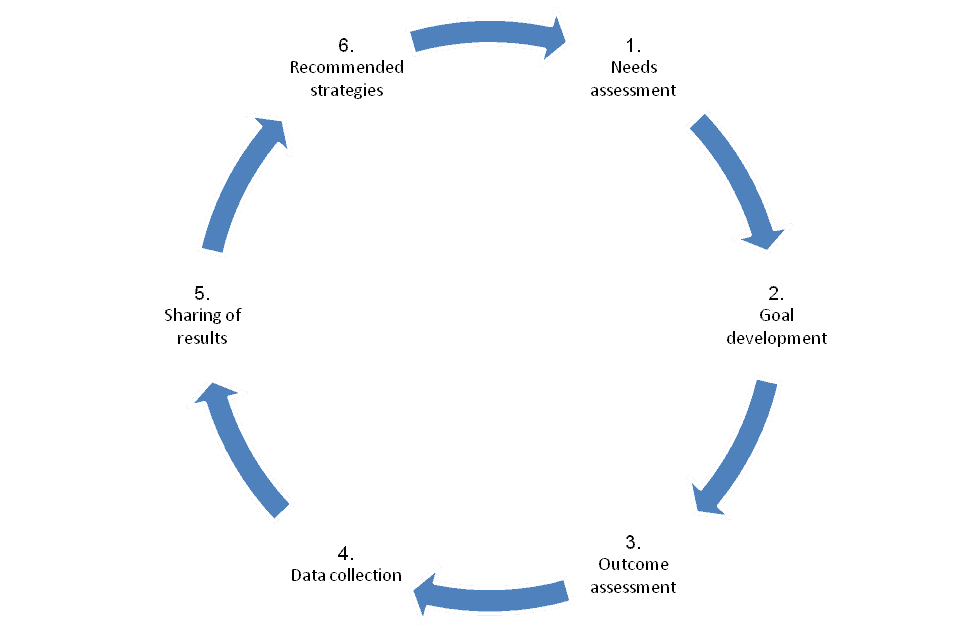3.3.1.2
The institution identifies expected outcomes, assesses the extent to which it achieves these outcomes, and provides evidence of improvement based on analysis of the results in each of the following areas: (Institutional effectiveness)
3.3.1.2. administrative support services
Compliance Judgment
X In compliance Partially compliant Non-compliant
Narrative
Francis Marion University has a comprehensive and integrated assessment, planning, and budgeting process in place. Through this process, expected outcomes are identified and assessed, and evidence of improvement is documented, as illustrated in the Agency Head Assessment Report 2015-2016 [1].
Administrative Support Planning Process
The processes for Administrative Unit planning and institutional effectiveness include an evaluation by administrative offices driven by identified goals and missions. Figure 1 below provides a graphical representation of the cyclical planning and evaluation process.

Figure 1. Program/Unit Planning and Evaluation Process
In the “Needs Assessment” phase, each administrative unit reviews the extent to which it its accomplishing its mission and develops preliminary plan for the upcoming year based on the actions items identified in the previous year. There is also a review of the budget implications for any proposed change. In the “Goal Development” phase, each administrative unit finalizes its vision, goals and goal indicators for upcoming year with assistance from the Institutional Effectiveness and Institutional Research Offices. During this phase unit outcomes are refined.
In the “Outcome Assessment” phase, assessments procedures are determined and the implementation period begins. A description of the methods and procedures are provided during this phase. In the “Data Collection” phase, information is gathered in order to evaluate the stated goals. In the “Sharing of Results” phase, preliminary outcome evaluations are collected. Determinations are made regarding the targets– were they achieved or not achieved. In the “Recommended Strategies Phase,” IE Reports are finalized and action items are developed for the upcoming year.
Systematic Planning and Evaluation
Responsibility for the planning process is shared by the President and his cabinet. The University is organized along the following administrative divisions as summarized in Table 1:
Office | Function |
|---|---|
| Academic Affairs (Provost) | The division of Academic Affairs includes all academic departments within the University, organized into a College of Liberal Arts and three professional schools, the School of Business, the School of Education and the School of Health Sciences. The division also includes Enrollment Management. |
| Administration | The division of Administration is responsible for Human Resources, Campus Technology, Institutional Research, Planning, Institutional Effectiveness, Instructional Technology, Telecommunications and Asset Management, and Counseling and Testing. |
| Business Affairs | The division of Business Affairs is responsible for the University’s Business Operation, Accounting for all Revenues and expenditures, maintaining the University’s Facilities, Campus Police, Dining Services, Housing, Purchasing, Contractual Services, and the Patriot Bookstore. |
| Development & Foundation | The Development division is responsible for coordination of University efforts to secure financial support from the private sector and to serve as the receiving point for gifts of dollars, securities, works of art, land, and equipment. This is done primarily through the Francis Marion University Foundation, the Alumni Association, the FMU Fund, and the Swamp Fox Club. |
| Public Affairs/Communications | The Public Affairs Office is responsible for communicating information pertaining to FMU. The office serves as the official communications channel through which the University disseminates information internally and externally. The office has four major functions: (1) external media relations, (2) internal communications, (3) production of official University publications for off campus audiences, and (4) marketing and communications support for University initiatives. |
Table 1. Administrative Divisions
Administrative offices at the University have defined their purpose and mission to align with the University’s mission. These administrative units develop service and administrative expected performance outcomes that are identified in their annual Institutional Effectiveness Reports. Each administrative support unit annually identifies expected Program Outcomes (POs) that are linked to the mission statement and strategic priorities [2, 3, 4].
Planning and Institutional Effectiveness
Francis Marion is committed to the continuous evaluation and improvement of each and every component of the University from its educational programs to the administrative and support offices that serve them. The Director of Institutional Effectiveness notifies staff and administrators periodically about opportunities to better understand how to develop unit outcomes and action items [5]. For example, in May and April 2016 over three dozen professionals attended Institutional Effectiveness workshops from various offices that included the Division of Student Affairs, Campus Technology, the Registrar, Admissions, Campus Police, Business Affairs, Public Affairs, Counseling and Testing, and Student Health [6]. The attached training slides provide an overview of the training [7]. Administrators responded favorably to the workshop sessions with most of them reporting that the training was “very helpful” [8]. The University has a comprehensive institutional effectiveness program that routinely monitors continued administrative office alignment with institutional mission, the identification of salient process outcomes, the measurement of meaningful quality indicators, and the implementation of improvements.
Documentation
- Agency Head Assessment Reports 2015-2016
- IE Unit Reports for Accounting Office
- IE Unit Reports for Office of Public Affairs
- IE Unit Reports for Purchasing Office
- Online Sign-up Form for IE Workshops
- Sign-in Sheets for IE Workshops
- IE Training Slides-Administrative Offices
- Administrative Offices Evaluation Report of IE Training